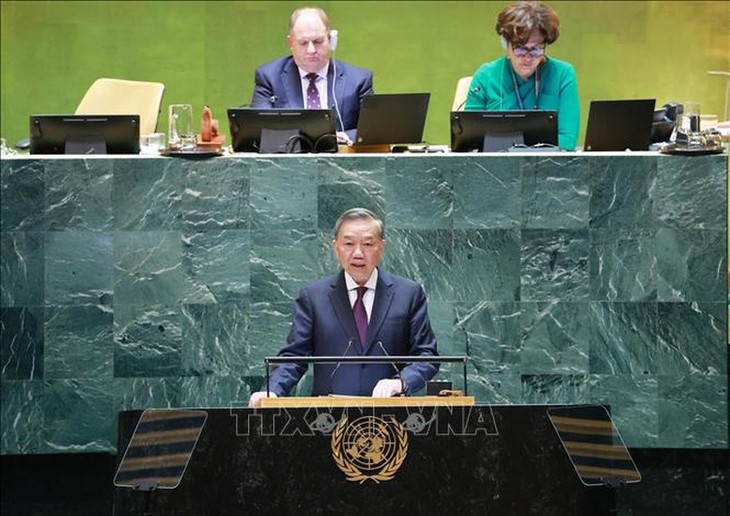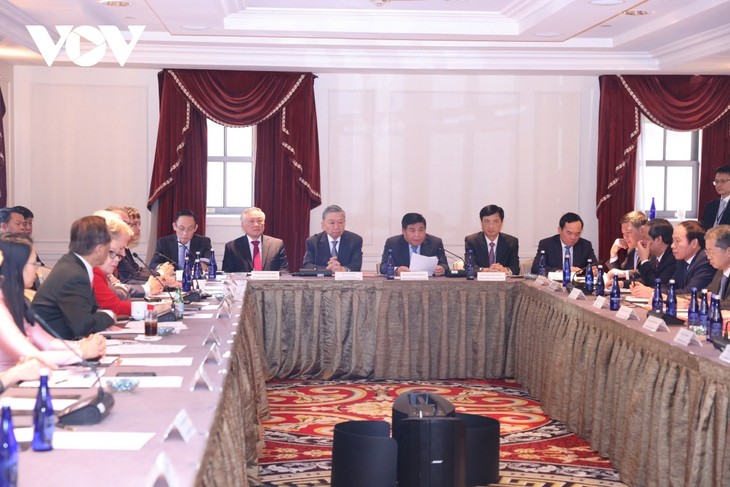(VOVWORLD) - Scientific and technological achievements must serve social progress, focus on humanity, liberate and develop humanity in a comprehensive manner, constantly improve life, for the benefit and happiness of humanity and for future generations, said Vietnamese Party General Secretary and State President To Lam. Addressing the UN Summit for the Future on September 22, the Vietnamese top leader said Vietnam is prioritizing scientific and technological development and innovation to serve social progress.
 Party General Secretary and President To Lam speaks at the General Debate of the High-Level Week at the UN General Assembly's 79th session (Photo: VNA) Party General Secretary and President To Lam speaks at the General Debate of the High-Level Week at the UN General Assembly's 79th session (Photo: VNA) |
Vietnam is at a critical juncture in its transition to a digital, green, circular economy, which require the robust growth of science, technology, and innovation to drive productivity, quality, and economic competitiveness.
Strategic choice
Addressing a workshop on semiconductor and AI development on Sunday in New York, General Secretary and President To Lam reaffirmed Vietnam's commitment to rapid, sustainable development based on science, technology, and innovation. He said developing semiconductor and artificial intelligence is not just a necessity but a strategic choice and priority for advancing the country's scientific and technological capabilities. This is one of Vietnam’s strategic breakthroughs to enhance socio-economic development, said Mr. To Lam.
 General Secretary and President To Lam attended the seminar with the theme "Enhancing Vietnam - US cooperation in developing the semiconductor industry and Artificial Intelligence" (Photo: VOV) General Secretary and President To Lam attended the seminar with the theme "Enhancing Vietnam - US cooperation in developing the semiconductor industry and Artificial Intelligence" (Photo: VOV) |
“In line with our three strategic breakthroughs—infrastructure, human resources, and institutional reforms—Vietnam is focusing on digital transformation based on advanced technological development. For example, we aim to improve institutional frameworks in the digital economy, build sustainable infrastructure, ensure access to clean energy to boost the development of digital technology, and ensure sufficient water resources to enhance growth. At the same time, Vietnam is committed to upgrading its transportation infrastructure—by land, sea, and air—with international connections,” Lam said.
Prime Minister Pham Minh Chinh recently signed a decision enacting the Semiconductor Industry Development Strategy until 2030 and Vision to 2050. By 2030, the semiconductor industry is expected to generate over 25 billion USD in annual revenue and employ more than 50,000 engineers. From 2030 to 2040, Vietnam aims to become a global semiconductor hub, integrating domestic self-reliance with foreign direct investment. By 2050, Vietnam is expected to be among the world's leading semiconductor producers.
Vietnam has established a legal framework to attract investment and develop its semiconductor industry. As part of this effort, the Investment Law and Corporate Income Tax Law have been amended to offer special incentives for high-tech, large-scale, high-value-added projects, including semiconductor manufacturing. The Science, Technology, and Innovation Development Strategy to 2030 has identified technologies such as chip manufacturing and semiconductor components as core areas for development in the coming decade. Additionally, in 2021, Vietnam introduced a national strategy for AI development.
Serving social advancement
Vietnam has an ambitious vision for semiconductor industry development. It has attracted global giants from the US, South Korea, Japan, Taiwan (China), and the Netherlands. Domestically, companies like Viettel, FPT, and VNChip are actively engaging in the market. Rizwan Khan, managing partner at Acclime Vietnam, noted that regulatory changes over the past decade have created a favorable environment for businesses, particularly in the semiconductor and digital sectors.
Minister of Planning and Investment Nguyen Chi Dung said: "The semiconductor industry depends on many factors. It’s important to establish an ecosystem with supportive policies, a skilled workforce, and modern infrastructure. All these factors must be coordinated. We’re reforming investment laws to attract more investors and stimulate further growth in the semiconductor sector, which is expected to make a significant economic contribution in the coming years."
The next 3-5 years are critical for Vietnam to address infrastructure and workforce challenges. As global competition for a place in the semiconductor value chain intensifies, consistent policies and effective implementation will be key to Vietnam's success.